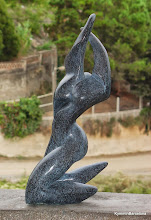She had packed the overnight bag using a mental checklist of all she meant to leave behind. Despair. His toothbrush. Longing. Birth control. Impatience. As she unpacked her pajamas and laid them on the bottom bunk, the one between his best friend’s wife and her favorite of his female classmates, she tried to think of a joke to tell at the anniversary supper. Her daughter leaned down from the top bunk and tapped her shoulder.
“Why do you have to tell a joke?” she asked. “You aren’t funny.”
“I don’t have to tell a joke,” she replied, “and thanks for the vote of confidence. It would just be nice to feel like I was more a part of the gang, you know?”
“But you are. We always come.”
“They’re Papa’s classmates, not mine, you know that. They want you here, really. Hey, you could tell a joke.”
Chiara snorted and flopped back on the bed. “Yeah, right. You never laugh at my jokes.”
“Your jokes aren’t funny.”
“Were Papa’s jokes funny?”
“No.”
“The other mothers don’t tell jokes, either.”
“Well, I’m not the other mothers, am I? I would like to be able to tell a joke, like the fathers do.”
She knew she was digging too far into the hole she warned herself to climb out of (what’s the first rule of holes? When you’re in one, stop digging!). Where had she packed the Tolerance? Patience? Indifference? She took the cosmetic bag out and shook it. Where were the pills for a sense of belonging? The lipstick for smiling as conversations begun 25 years ago wafted over her? The perfume to wipe out the stench of lonesomeness?
“Why aren’t you playing with Jessica and Patricia, anyway? They’re your age.”
“Is it an obligation?” Chiara’s face was turned away towards the wall.
“Of course it’s not an obligation, but it is why we’re here, after all. It’s certainly not for my sake.”
“Why don’t you like Papa’s friends?”
Patience. Over there, under the bedside novel.
“Who said I didn’t like Papa’s friends? I’m here, aren’t I? But, really, I do this for you, so why don’t you go play?” She stood up to shake Chiara’s shoulder and saw that her eyelashes were glistening with tears. “Chiara, honey, what’s wrong?”
“Nothing. Leave me alone.” She shrugged her mother’s hand off. “They don’t want me to play with them. They won’t even talk to me.”
Benevolence. Magnanimousness. She did, however nonjustifiably, know how her daughter felt. Self-pity? She had most certainly not packed that one. Compromise. A grain of salt. Comradeliness. Right there in her back pocket.
“Okay, listen,” she stroked Chiara’s bangs back from her forehead. “We’ll wash our faces and comb our hair and then just go out and wait for dinner, okay?” She paused. “We’ll go think of a joke to tell, how’s that?”
Chiara turned towards her mother for a hug, sniffed and said: “What did the bra say to the hat?”
Chiara smiled and her mother waited. Chiara continued:
“You go on a head. I’ll give these boobs a ride.”
“A lift! I’ll give these two a lift!” She corrected as she pulled Chiara, her cheeks burning a bright red, off of the bunk and set her down on the floor.
“You go on ahead. I’ll give these two a lift,” she said again.
Chiara repeated it: “You go on a head, I’ll give these two a lift.” She shook her head. “I don’t get it.”


 '13 Untitled (Sally) 51,668;
'12 Barcelona Clash 51,878;
'11 Mojo Madness 52,793;
'10 Changing Directions 53,400;
'09 Daybreak 56,565;
'08 Vacant 52,486
'13 Untitled (Sally) 51,668;
'12 Barcelona Clash 51,878;
'11 Mojo Madness 52,793;
'10 Changing Directions 53,400;
'09 Daybreak 56,565;
'08 Vacant 52,486